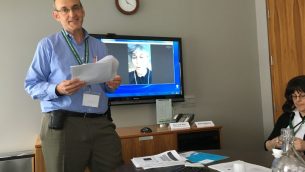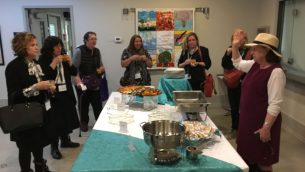Original Article in Chabad.org:
Sometimes what happens in Vegas shouldn’t just stay in Vegas. Levi Harlig’s extraordinary bar mitzvah is one of them.
Levi gave a flawless reading of Parshat Naso, the longest Torah portion of the year, and delivered a Chassidic discourse in Yiddish and Hebrew last Shabbat morning at Chabad of Green Valley/Henderson in Las Vegas. The following evening, the 13-year-old sang and drummed for three hours with entertainer Avraham Fried at a community-wide celebration at the Four Seasons Hotel on the Las Vegas Strip.
That would be an exciting experience for any bar mitzvah boy. But for members of the community who have known Levi since birth, the accomplishment was nearly miraculous.
When Levi was 15 months old, his mother, Chaya Harlig, co-director with her husband, Rabbi Mendy Harlig, of Chabad of Green Valley/Henderson, realized that something was not quite right about their son. “He wasn’t making eye contact or following directions. We got him into all kinds of therapies right away—occupational therapy, speech therapy and more.” Three months later, the Harligs learned that Levi had autism. He has difficulties with personal space and reading social cues, and he often focuses on topics of interest to him but not necessarily to other people.
“My husband took it a lot harder than I did,” said Chaya. “I think women have more bitachon [faith]. We set out to make Levi the best Levi he can be!”
In response to her husband’s concerns about where Levi would go to school, whether he would have a bar mitzvah and other issues related to Levi’s future, Chaya reassured him. “He will have a bar mitzvah, he will get married, and he will use his talents. He is really special!”
Harlig quickly realized that his wife was right. Levi has extraordinary talents, including perfect pitch and what his parents refer to as “audiographic memory.” Levi is able to remember essentially anything he hears, including songs, speeches, conversations he has heard in synagogue or around the Shabbat table.

The bar mitzvah boy shares Torah learning at the celebration. (Photo: Norina Kaye)
Rabbi Harlig began including Levi in the life of the synagogue from an early age. “Each Yom Kippur, I would give my talk and then find a song in English connected to the sermon for Levi to sing. There was not a dry eye in the shul!” Levi regularly leads the congregation in prayer, and he greets congregants by name, upon arrival—often in a loud voice from up on the bimah!
Levi’s important role in the synagogue has allowed members of the community to become comfortable with a person with disabilities. “Levi is bringing people into the Henderson Chabad. He has a warm smile and welcomes everyone!” reports his father.
Wayne Krygier, a member of the Las Vegas Chabad community since relocating from Canada in 1989, concurs. “Levi is the heart and soul of the synagogue. The shul is his life—he feels so at home here!” Krygier jokes that Levi’s greeting everyone in a loud voice as they enter serves as an incentive to arrive on time.
Dr. George Harouni, a local dentist and regular Chabad of Henderson attendee, observes, “People are now accustomed to seeing someone like Levi. He has been part of the community since birth; no one thinks of him as being different.”
When Levi’s bar mitzvah approached, his grandfather, Rabbi Kalman Shor, who also serves as a rabbi for the Chabad of Henderson community, taught him Torah cantillation and sat with him for regular practice sessions. He notes that Levi’s musical talents made his job “much, much easier—once he learns it, he remembers it.” The congregation was clearly moved at the bar mitzvah. “They thought it was beautiful and emotional. And they were impressed that he made no mistakes.”
Jeff Berkow, a retired South African-born businessman and longtime active volunteer in Chabad of Henderson reports: “Levi was flawless! He sang the trope [cantillation] like a chazzan with 30 years of experience. People were amazed!”

Singing with Avraham Fried. (Photo: Norina Kaye)
High Praise From a Noted Singer
Levi’s bar mitzvah celebration continued with an Avraham Fried concert, attended by 300 people, a natural choice given Fried’s musical talents and personal qualities. Harlig explains, “He is a beautiful singer, a caring person, and he always showed love for Levi. I figured people would see them sing together, love it and get inspired. They were on a high.”
Fried reflects on the special Shabbat and evening noting, “I knew this bar mitzvah would be very special and memorable but, boy, this was out of the park! Levi loves music. He sings beautifully, and has a great ear and rhythm. He knows all my songs exactly as they appear on the CD. Every musical line and harmony, every place where the song modulates, and the intros and endings, not to mention every special inflection that I sing! We sang so many songs together—Hebrew and English. Levi was conducting the orchestra and was totally in charge. I am lucky to have met Levi years ago. I’m lucky he invited me to his special celebration. I’m very happy he has such good taste in music!”
The community’s embrace of Levi and inclusion of people with disabilities extends beyond one special Shabbat. The Harligs and the community dream of making Chabad of Green Valley/Henderson the “central address” in Las Vegas for including people with disabilities. “Going forward, we hope to continue showing the importance of inclusion, which Chabad has been doing for many years—unconditional love for all humans,” says Harlig.

Father and grandfather listen to the bar mitzvah boy. (Photo: Norina Kaye)
Harouni is excited about Chabad’s potential to become even more welcoming to people with disabilities. “Inclusion will be a great addition to our shul. We could be a real center to offer people with disabilities a sense of belonging and an opportunity to be a part of the community.”
Berkow, who assists Harlig in running Chabad, proudly notes, “I want our Chabad to be theshul of inclusion, the place that caters to people with special needs and where inclusion is the centerpiece.” He also hopes Chabad of Green Valley/Henderson will serve as a satellite to the already successful Friendship Circle 15 miles to the north.
Chaya Harlig notes that Chabad recently purchased land, and future plans include Levi’s Place, where people can come for homework help, tutoring, programming and friendship. “We will have a community center serving many families. We will be inclusive and work together with all children on all levels.” She continues to hear of the impact that Levi has had on the Las Vegas Jewish community. “Because of him, people are becoming more religious, closer to the synagogue and Hashem.” She notes that she knows other shluchim families with children with disabilities, and that Chabad offers resources and support.

(Photo: Norina Kaye)
Inclusion Initiative a Welcome Partner
Rabbi Harlig has found a natural partner in his mission towards greater inclusion the Ruderman Chabad Inclusion Initiative (RCII), directed by Dr. Sarah Kranz-Ciment. RCII is dedicated to building on the philosophy and mission of Chabad-Lubavitch by providing Chabad communities around the globe the education and resources they need to advance inclusion of people with disabilities. RCII engages Chabad’s network of resources to create a culture of inclusion so that all Jews feel welcomed, supported and valued throughout their entire lifecycle.
RCII is producing a song, a music video and an inclusive mural that shows that everyone belongs. It has also developed an an online bar and bat mitzvah guide, titled “Practical Ideas for Inclusive Bar and Bat Mitzvahs.”
Kranz-Ciment is proud of the work of the Harligs, their community and of Levi’s bar mitzvah, which she notes was “an opportunity to publicly show and make a statement about his many talents.” She continues, “Every Jewish soul is meaningful, and is obligated to be Jewish in the best way he or she can. The Rebbe said, ‘Your birthday is the day Hashem decided the world can’t exist without you. Inclusion is a chance to bring this to the forefront and show that what each person can do is valuable.’ All of us have a place in Judaism.”

(Photo: Norina Kaye)







